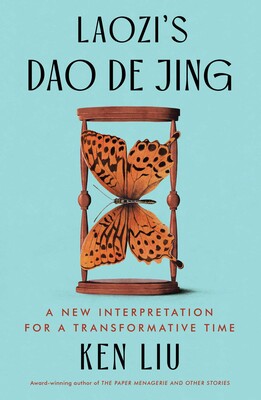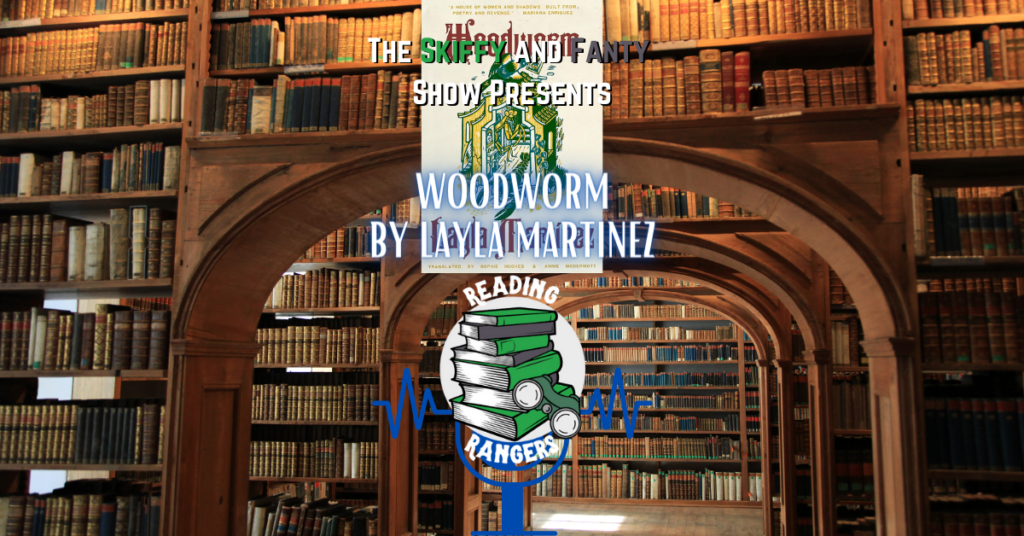Book Review: Laozi’s Dao De Jing (Ken Liu)

Translation is difficult, because each language encompasses at least one culture’s unique way of looking at the world. That’s hard enough when different words carry divergent assumptions from one language to another, and enormously more difficult when a word, as such, doesn’t even exist in the translated-to tongue. (And speaking of tongues, sometimes the same sounds aren’t even shared between languages, and some people can’t distinguish between sounds that change meanings completely!) Some words carry heavy cultural baggage, representing complex concepts in themselves. Obviously, Dao (which is often translated as “The Way” but which Ken Liu mainly leaves as just “Dao” so that readers are reminded of its multifaceted weight), De (often translated as virtue, or power, action, etc.), and Jing (often translated as book, or canon, treatise, etc.) are three such words. And when each sentence orchestrates interactions between complex concepts, conveying an entire treatise of philosophy and religion between cultures that share very little history and focus on different values might seem almost insurmountable. However, Ken Liu is far from the first person to attempt to translate Laozi’s Dao De Jing. The text, written in China during what Westerners label as the 4th century BCE, was first translated into English in 1868 by a Scottish missionary, and Wikipedia says it has been translated into Western languages more than 250 times. Indeed, I seem to remember a copy of Lao Tsu’s Tao Te Ching (different Romanized versions of the same Chinese words) floating around my college dorm, and I probably leafed through it then, although I can’t say I retained any of it. So, why is Simon and Schuster publishing a new version, Laozi’s Dao De Jing: A New Interpretation for a Transformative Time, by Laozi and Ken Liu, tomorrow (Aug. 20)? Publishers have their reasons; the more pertinent question to me is why anyone should read this in preference over any other versions. Liu himself would probably say that people should also read other versions in addition to his, as he himself is in conversation with interpretations across the centuries. (Although it’s not quite a conversation, because according to Liu’s interpretation of Laozi, the words of long-dead writers are merely the tracks of their thoughts, not the thoughts themselves.) For me, my primary reason for reading Laozi’s Dao De Jing: A New Interpretation for a Transformative Time was just that I wanted to see what Ken Liu had to say. I first became aware of Liu via a 2011 Podcastle audio “reprint” version of his deeply moving short story, “The Paper Menagerie,” and read his Paper Menagerie collection of stories later. He also wrote the Dandelion Dynasty silkpunk epic fantasy series. (He’s been a lawyer and a programmer, too.) Perhaps most relevantly here, works that he has translated into English, including “Folding Beijing” by Hao Jingfang, which I loved, and The Three-Body Problem by Liu Cixin, which I respected, have won major awards. I was fully confident that a Ken Liu translation would be both elegant and accessible, or as accessible as a translated foundational philosophical literary text could hope to be. Reinterpretations of older works have actually been pretty popular in science fiction circles in recent years; for instance, Zach Weinersmith’s and Boulet’s Bea Wolf was a 2024 Hugo finalist for Best Graphic Novel, just a few years after Maria Dahvana Headley’s Beowulf: A New Translation took the Internet by storm. However, despite being reviewed here at Skiffy and Fanty, mainly for the sake of its translator, Laozi’s Dao De Jing is not a work of speculative fiction. It’s a collection of many short chapters composed of short paragraphs advising how to think about oneself, the world, and how one should *be* in the world and interact with it (including other people) — or NOT interact, interspersed with sections where Liu explains his translation process and the choices he made. These interstitial sections start out quite long, involved, and frequent, and gradually become shorter, sparser, and rarer, as Liu becomes more comfortable with what he’s doing, and trusts that the readers will also acclimate themselves to the work and how he has been approaching it. In addition to translating individual words, Liu had to decide how the book actually began; and even before that, which version of “the book” to follow: the traditional “received text” or the text from scrolls discovered in the 1970s, which starts in the middle of the traditional text and puts the beginning half at the end, or the fragmentary text from bamboo slips found in a tomb in the 1990s. Liu wrote about applying his own knowledge of the constantly shifting writing/editing/publishing process in deciding how much weight to give each version, especially given Laozi’s own emphasis on true understanding and wisdom over the language that tries to encapsulate them. Because my review copy forbids quoting until verified with the finished book, I can’t share Liu’s translations or his own words. But I can tell you that it’s pleasantly fascinating to read both the translated text and Liu’s musings on their meanings, to wrestle with the writings and wonder how many of them, or how much of the whole, may be applicable to one’s own life. Many of the chapters contain apparent self-contradictions, or at least concepts that I find myself resisting, such as not valuing the rare and talented, or admonitions against taking actions (and I like the idea of leading by the example of non-conflict, but as a trained wordsmith, I find it hard to eschew arguments); however, I’m aware that this resistance may be because I don’t sufficiently understand these Daoist ideas yet. Liu himself says that when he started actually reading the book himself during the pandemic, instead of relying on quotes and cultural memories, he wanted to argue with it, and only later started to really accept it enough to converse with it. The book is pretty short if one simply measures by its 176 pages, but I strongly advise against rushing through it. So does
779. Woodworm by Layla Martinez — Reading Rangers

https://media.blubrry.com/skiffyandfanty/dts.podtrac.com/redirect.mp3/archive.org/download/sand-f-779-woodworm/SandF_779_Woodworm.mp3Podcast: Play in new window | DownloadSubscribe: Apple Podcasts | Spotify | Android | Email | TuneIn | Deezer | RSSGenerational terror, walldads, and haunted homes, oh my! Shaun Duke and Daniel Haeusser join forces to discuss Layla Martinez’s Woodworm (out now from Two Lines Press). Together, they explore the novel’s themes of generational trauma, class warfare, the horrors of growing up, and even what it’s like living in a cursed home. Thanks for listening. We hope you enjoy the episode!
Speculative Fiction in Translation #17: Science Fiction and Fairy Tales

https://media.blubrry.com/skiffyandfanty/dts.podtrac.com/redirect.mp3/archive.org/download/sfitepisode17sciencefictionandfairytales/SFiT–Episode_17–Science_Fiction_and_Fairy_Tales.mp3Podcast: Play in new window | DownloadSubscribe: Apple Podcasts | Spotify | Android | iHeartRadio | Podchaser | Podcast Index | Email | TuneIn | Deezer | RSSThis month, Rachel and Daniel talk about the SFiT that came out in September and what they’re reading now. As Daniel points out, several of the short stories they discuss have some kind of fairy-tale element to them, leading the co-hosts to think about the interesting connections between that genre and science fiction. And while September’s short SFiT was dominated by stories from Korea and China, the novels, collections, and anthologies came from Japan, Israel, and Germany. Rachel talks about how Japanese SF media is taking over her house (books, Pokemon cards, manga, etc.), and Daniel shares his love of Francesco Verso’s novel Nexhuman, which Daniel reviewed on his site. Remember: with new stories and books coming to their attention each week, make sure to check the SFT website for updates. Enjoy, and keep reading! A bientôt!
Speculative Fiction in Translation #16: Looking Back on the Summer’s SFT

https://media.blubrry.com/skiffyandfanty/dts.podtrac.com/redirect.mp3/archive.org/download/sfitepisode16lookingbackonsummersftl/SFiT–Episode_16–Looking_Back_On_Summer_SFTl.mp3Podcast: Play in new window | DownloadSubscribe: Apple Podcasts | Spotify | Android | iHeartRadio | Podchaser | Podcast Index | Email | TuneIn | Deezer | RSSRachel and Daniel return this month with a wide-ranging conversation about the SFT they’ve been reading/hearing about/wanting to read from the summer. While Rachel was reading Liu Cixin’s Supernova Era (tr. by Joel Martinsen), The Aayakudi Murders by Indra Soundar Rajan (tr. Nirmal Rajagopalan), and The Dreamed Part by Rodrigo Fresan (tr. Will Vanderhyden), Daniel was finishing Laurence Suhner’s Vestiges in the original French, starting Jean Ray’s Whiskey Tales (tr. Scott Nicolay), and reading Francesco Verso’s Nexhuman (tr. Sally McCorry). Then they talk about some of their favorite short fiction from the summer, what they’re looking forward to in the fall, and the very sad closing of Haikasoru, Rachel’s favorite SFT imprint. Remember: with new stories and books coming to their attention each week, make sure to check the SFT website for updates. Enjoy, and keep reading! A bientôt!
Speculative Fiction in Translation #15: An Interview with Julia Meitov Hersey

https://media.blubrry.com/skiffyandfanty/dts.podtrac.com/redirect.mp3/archive.org/download/sfitepisode15juliameitovhersey/SFiT–Episode_15–Julia_Meitov_Hersey.mp3Podcast: Play in new window | DownloadSubscribe: Apple Podcasts | Spotify | Android | iHeartRadio | Podchaser | Podcast Index | Email | TuneIn | Deezer | RSSThis month, Rachel has a special guest on the podcast! Julia Meitov Hersey (@JuliaMeiHersey), who translated the psychological-fantasy-thriller Vita Nostra from the Russian, comes on to talk about how she first started translating the complex, lyrical work of Marina and Sergey Dyachenko (@DyachenkoW); what makes translating speculative fiction unique; and her own future projects. Insightful and entertaining, this interview will send you straight to your local independent bookstore to buy Vita Nostra. You’re welcome! Remember: with new stories and books coming to their attention each week, make sure to check the SFT website for updates. Enjoy, and keep reading! A bientôt!
Speculative Fiction in Translation #14: Biological and Artificial

https://media.blubrry.com/skiffyandfanty/dts.podtrac.com/redirect.mp3/archive.org/download/SFiTEpisode14BiologicalAndArtificial/SFiT–Episode_14–Biological_and_Artificial.mp3Podcast: Play in new window | DownloadSubscribe: Apple Podcasts | Spotify | Android | iHeartRadio | Podchaser | Podcast Index | Email | TuneIn | Deezer | RSSApril brought us stories and books about the merging of the biological and artificial, zombification, organic routers, and much more. Plus we talk about what we’ve been reading, our favorite stories this month, and translations that we wish we could have yesterday. Remember: with new stories and books coming to their attention each week, make sure to check the SFT website for updates. Enjoy, and keep reading! A bientôt! P.S. It’s Jen’s fault this is late! Sorry about that, folks!

